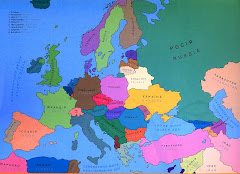


You always have to take off your shoes when you enter a Ukrainian home. It's the custom. I suspect that it derives from all the dirt, sand, and mud you bring in from the unpaved roads. After a hard rain last night, Panfelova was a mess this morning. No matter how careful I was biking around the puddles, and walking my bike when I had to, I pretty much had mud up to my ankles.
This is why you often find Ukrainian women on their hands and knees mopping the floors. Every Saturday for sure. But during the week, too. I have threatened to buy Luba a mop, but she won't hear of it. It's better to do it this way, she tells me, looking up with a satisfied smile on her face. She likes being busy like this.
When it's time for a meal, which is often, Ukrainian women have a huge task before them. First, the woman of the house goes to the garden that she has been cultivating since early Spring and sees what's ripe and ready. She picks the tomatoes, cucumbers, peppers, cabbage, onions, whatever is in season, fresh from her garden. She washes them off, then slices and dices. Berries, grapes, and melons are plucked from the vines; apricots, plums and apples from the trees. All have to be cleaned and prepared.
They must also be beautifully arranged on a plate. The fruits and vegetables always look like works of art on the table. A bouguet of dill and parsley or other fresh spice decorate the platters. Woe be the helper who doesn't have an artful way of presenting the bounties of nature!
Equally daunting to me is that much of this harvest has to be preserved: pitted, cut, sliced, boiled, and put in large sterilized bottles, with specially sealed caps, and stocked in storage cellars for use during the winter months. This is a whole production scenario in itself. It's huge. An ever-present task. Hours of time in the evenings, in the mornings, in the kitchen.
One good immediate result is sok or "compot," a fresh fruit juice that's always natural and available. In fact, the women take special pride in saying that all the food they prepare is “natural,” no preservatives, fertilizers or poisons in their food. Nothing genetically manufactured. All natural.
Of all the work associated with food production and preparation, I think gathering potatoes is the hardest. First they have to be dug up, which is quite a chore, and time-consuming. I never realized how hard this is, very hard work, and I usually associate it with the Irish. Maybe Idaho. But potatoes are a special Ukrainian food too. With the experience of the “Holodomer” always a present memory, potatoes take on special meaning at the Ukrainian table. Potatoes saved many a family from starvation.
Hours later, once you have a good-sized pile of potatoes, they have to be separated--big, small, medium. Then they have to be washed, peeled (this takes a lot of time, too), sliced, diced and cut in a variety of ways. I've gotten to be a good peeler, using the old one I brought from home (forewarned by a seasoned PCV), but Luba always beats me with her knife. She won't use a peeler like she won't use a mop.
The most preparation is for Ukrainian ratatouille. The eggplant, carrots, small potatoes, onions, peppers, tomatoes, spices, all have to be picked, washed, peeled, sliced, diced, and/or grated into tiny pieces. Luba does have a grater, and she is particular about which side is used. If Luba spies a piece of vegetable that is too large, she's at it with a knife. Same if she spies an eggplant or potato or carrot with some skin on it; she gets out her knife and re-peels. Nothing passes her watchful eye. It's the best form of production control I've ever seen, from garden to table.
Now I see why we don't usually have supper until 9:00 at night. But the meals are always delicious. Maybe it's the preparation, but everything seems to taste especially wonderful.
When Ukrainian women aren't working at a job, or cleaning at home, working in their gardens, preserving or cooking, they are preparing for guests. Family, neighbors, and friends, all get treated to elaborate gatherings and meals. A special borscht, for example. I've learned that there are many ways to prepare this national dish and many a secret recipe passed down from mothers to daughters. My PCV friend Jud claims to have created his own, which you can see for yourself at http://www.juddolphinadventure.blogspot.com/.
Beginning a meal with borscht shows you care. It takes a lot of time and a lot of love to prepare. I think every borscht recipe has this set of directions on it: sprinkle with love. It's the Ukrainian way. I am a grateful recipient of many such meals, and always feel warmly embraced by this Ukrainian tradition and generosity of spirit.
Today, dripping with rain, I bumped into Olga on the street. We stopped and chatted. I asked how she was. “Busy,” she said. “Always busy.” I know what she means.




























No comments:
Post a Comment